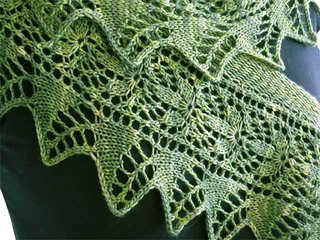patterns >  Fiber Dreams
Fiber Dreams
> Birdsfoot Fern

Birdsfoot Fern
I had way too many plants in my room when I was a teen. Way too many—more than 50 of them at one point. One of my favorites was one that I was completely unable to keep alive: the rabbit foot fern. The rabbit foot fern is still one of my all-time favorite plants, though I learned to not even try to grow them—they always die on me. But I think of them a lot: Their delicate, lacy leaves that sprout at seemingly any point at all along the soft, fuzzy, rabbit foot roots. Lovely. I quite naturally thought of this gorgeous plant when I was looking for a name for this pattern. You see, the trefoil stitch that runs along next to the lacy fern leaf border is also named for a plant. Another name for the trefoil plant is “birdsfoot.” See? Rabbit foot, birdsfoot, birdsfoot, rabbit foot… But in case you were wondering, though there is a plant called bird’s foot fern, it isn’t at all what I had in mind.
The lace portion of the scarf is knit back and forth starting with a provisional cast on of only five stitches, and growing to that portion’s full width by increases worked into the lace. At the far end, decreases are worked until only five stitches remain, which are not bound off, but held to be worked later. The center portion of the scarf is worked in garter stitch, in short rows, eventually incorporating the five live stitches on each end. It’s blocked into an attractive and easily wearable crescent shape that drapes well around the shoulders.
Size (width x length): 10.25 x 37, 10.75 x 41.5 (11.25 x 46, 11.75 x 50.5, 12.25 x 55) in; 26 x 94, 27.5 x 105.5 (28.5 x 117 , 30 x 128.5, 31 x 139.5) cm.
Yarn: 250, 300 (350, 400, 425) yards sport weight yarn
Skills: k2tog, ssk, YO, double YO, k3tog, s2-k1-p2sso, s1-k2togpsso, short rows, picking up stitches along the edge, 3 into 9 increase.
Notions: 2 stitch markers (optional), short length smooth waste yarn in contrasting color for provisional cast on.
Stitch patterns: Charted and written.
January 2016 update: 1) Written stitch instructions now flow seamlessly across each row. 2) All shaping stitches now picked up and knit before short rows begin, instead of just half of them. 3) Added four sizes, while I was at it, for a total of five sizes.
Auf Deutsch!
Ich hatte viel zu viele Pflanzen in meinem Zimmer, als ich ein Teenager war. Viel zu viele: über 50 zur gleichen Zeit. Bei einer meiner Lieblingsarten war es mir unmöglich, diese am Leben zu erhalten: der Hasenfußfarn (auch Goldtüpfelfarn) genannt. Er ist auch heute noch eines meiner Lieblingspflanzen, auch wenn ich bis jetzt nicht gelernt habe, ihn am Leben zu erhalten. Sie gehen leider immer ein. Ich liebe diese zarten, spitzenmusterartigen Blätter, die überall aus dem weichen, flauschigen Stengel wie Hasenfüße herauswachsen. Einfach wunderschön und deshalb dachte ich an diese Pflanze, als ich einen Namen für das Muster suchte. Auch das Muster, das am Farnmuster entlang wächst, ist nach einer Pflanze benannt (Vogelfußklee). Hasenfuß-Vogelfuß, Vogelfuß-Hasenfuß.
Die Lacemusterkante wird in Hin- und Rückreihen gestrickt und wird mit einem provisorischen Maschenanschlag von nur fünf Maschen angefangen. Es wächst dann bis zur vollen Breite. Am Ende verringert sich die Maschenzahl, bis zum Schluss nur fünf Maschen übrig bleiben. Diese werden nicht abgekettet, sondern in das Mittelstück des Tuches am Ende eingestrickt. Das fertige, gespannte Tuch bekommt eine attraktive und gut um die Schultern zu tragende Halbmondform.
Garn: in Sockengarnstärke 4-6fädig, 360 m
Nadel: 4mm (US 6)
Häkelnadel: 4 mm oder größer (US 6 G) für provisorischen Anschlag
Maschenprobe: 21,75M x 19,25 R = 10 cm im Kleemuster, gespannt
Größe (im angegebenen Garn): 30 x 128 cm
Weiteres Zubehör: 1 Maschenmarkierer, etwas glattes Garn für den prov. MA
Schwierigkeitsgrad: für erfahrene Strickerinnen

10077 projects
stashed
24093 times
3321 projects
stashed
9125 times
1951 projects
stashed
4279 times
- First published: October 2011
- Page created: October 12, 2011
- Last updated: June 12, 2019 …
- visits in the last 24 hours
- visitors right now






















